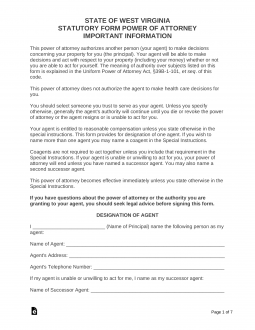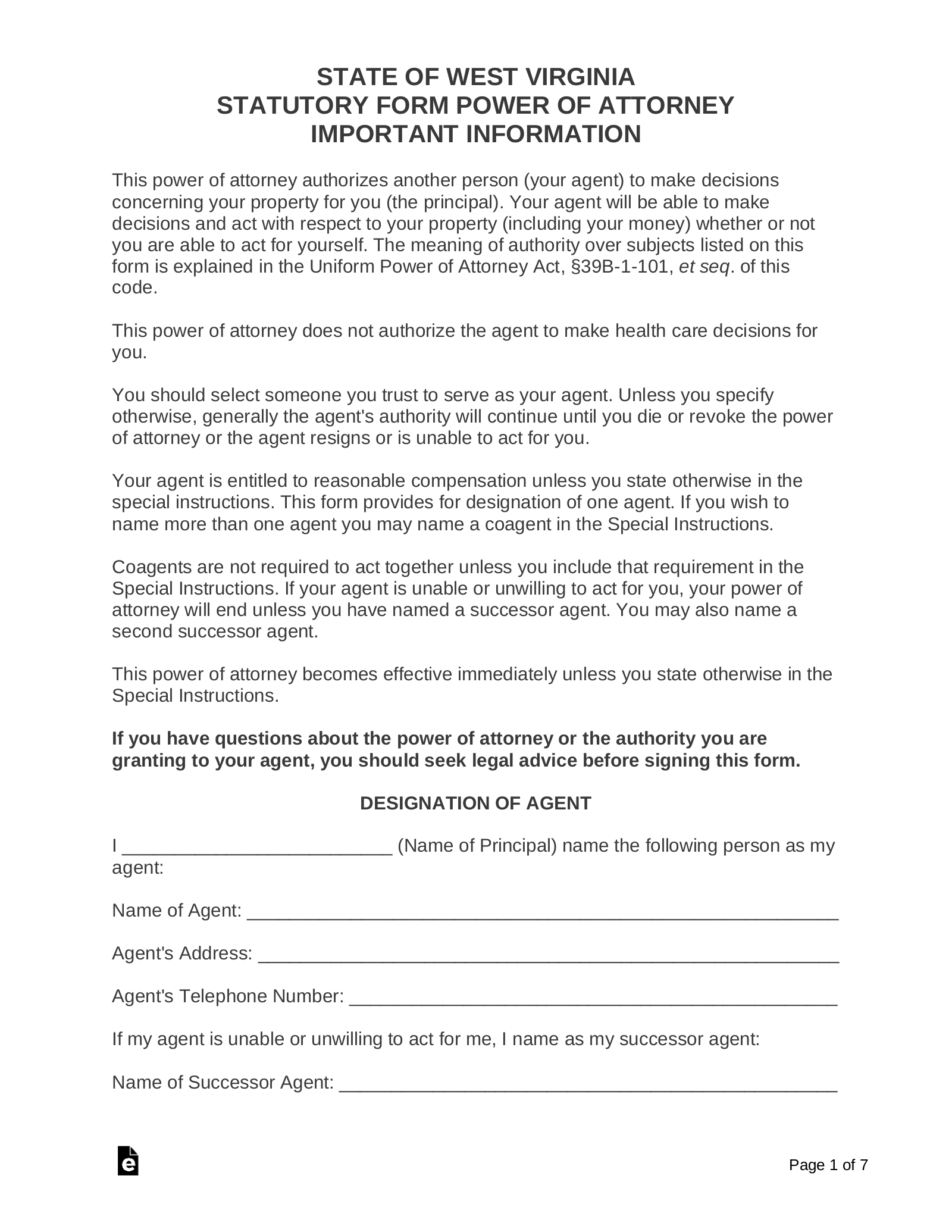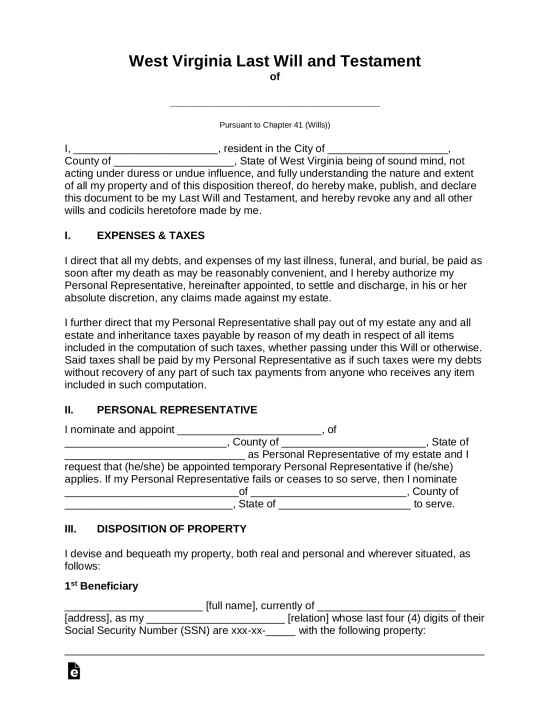Updated October 10, 2023
A West Virginia durable statutory power of attorney form is created for the purpose of choosing a person to act as an agent and handle the financial affairs of someone else (“principal”). The term “durable” means the designation can last for the lifetime of the principal unless revoked. Even if the principal should become incapacitated, a durable power of attorney remains valid. For this reason, it’s recommended to only choose someone who can be trusted for the agent designation.
Table of Contents |
Laws
WV Code § 39B (Uniform Power of Attorney Act)
Definition of “Durable”
“Durable,” with respect to a power of attorney means not terminated by the principal’s incapacity (WV Code § 39B-1-102(2)).
Definition of Power of Attorney
“Power of attorney” means a writing or other record that grants authority to an agent to act in the place of the principal, whether or not the term power of attorney is used (WV Code § 39B-1-102(7)).
Signing Requirements
The principal must have their signature acknowledged before a notary public. If the agent decides to use the optional Agent Certification form, the agent must sign said document in the presence of a notary public and attach it to the power of attorney (§ 39B-1-105, § 39B-3-102).
Statutory Form
West Virginia’s statutory durable power of attorney form can be found within § 39B-3-101.
How to Write
Download: PDF, MS Word, OpenDocument
Designation Of Agent
(1) Name Of Principal. The Issuer behind this paperwork, known as the West Virginia Principal, must be named.
(2) Name Of Agent. The West Virginia Agent who will be able to use the authority this document conveys to carry out the Principal’s directives must be identified.
(3) Agent’s Address.
(4) Agent’s Telephone Number.
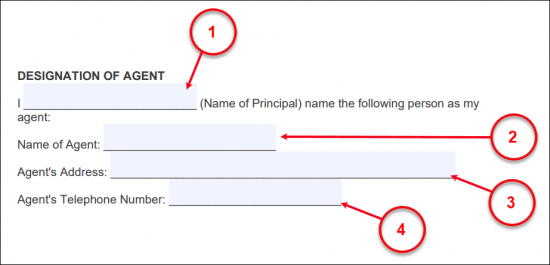
(5) Successor Agent Name. A Successor Agent can be held in reserve in case the West Virginia Agent is unwilling to carry out directives or wield principal power, is unable to fulfill the role, or has had his or her powers revoked. This enables the authority defined in this document to be transferred to the Successor Agent for use in West Virginia thus ensuring a continuous transfer of principal authority. Naming a Successor Agent to the West Virginia Agent is not mandatory but is strongly suggested as a wise precaution.
(6) Successor Agent Address.
(7) Successor Agent Telephone Number.
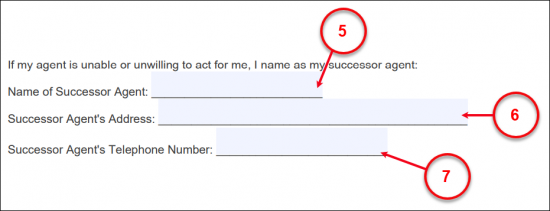
(8) Second Successor Agent. Another wise precaution is to set an additional Party in reserve should the West Virginia Agent and Successor Agent both fail to fill the Attorney-in-Fact role for the Principal. This Second Successor Agent must be identified for the powers in this paperwork to be transferred to him or her if needed.
(9) Second Successor Agent Address.
(10) Second Successor Agent Telephone Number.
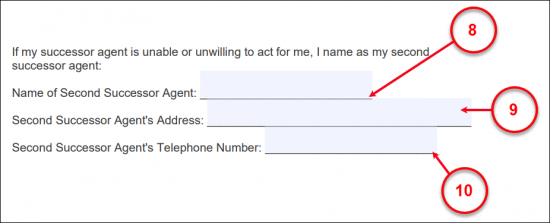
Grant Of General Authority
(11) Delegate Certain Powers. The Principal should review the list of general topics naming powers that can be delegated to a West Virginia Agent (or Attorney-in-Fact). In order to authorize the Agent to carry out the Principal’s directives with authority, the Principal will need to initial the powers on this list that he or she wishes to grant to the Agent. The Principal should only attend to this list if he or she does not wish to give the Agent a wide range of power across all topics but prefers, instead, to authorize the Agent to work only in certain matters that he or she approves by initial.
(12) Simultaneously Grant All Powers. The West Virginia Principal can grant principal authority in all the listed areas by initialing the final statement of the power list.
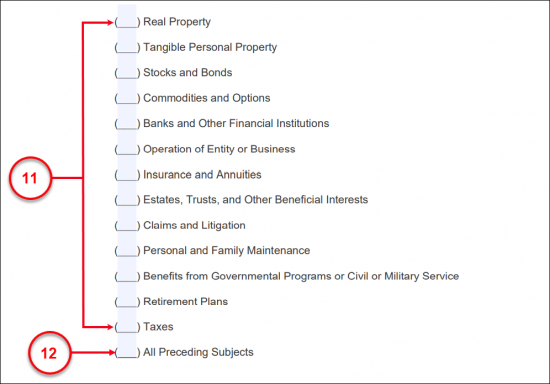
Grant Of Specific Authority
(13) Inter Vivos Trust. Certain actions must be approved beforehand by the Principal before the Agent can be allowed to take them. This is the case even if the above list was tendered with the appropriate approvals and additional provisions have been provided. Thus a list of principal actions must be reviewed so that each action approved can be shown as an authorized action with the Principal’s initials. For example, in the first list item, the Principal can approve the Agent’s interaction and use of principal control over Inter Vivos Trusts by initialing the accompanying line or the Principal can show that the Agent does not carry the authority to handle Inter Vivos Trusts by leaving this item unmarked.

(14) Gifting In West Virginia. If the Agent is to be able to issue gifts (as per the West Virginia Uniform Power Of Attorney Act) then the second specific action must be initialed.
(15) Survivorship. If the Principal wishes the Agent to be able to make or alter rights of survivorship, then he or she must initial the third specific action defined.
(16) Beneficiary Designation. The Principal’s Beneficiaries designations can be made or altered by the West Virginia Agent if the fourth action statement is approved with the Principal’s initials.
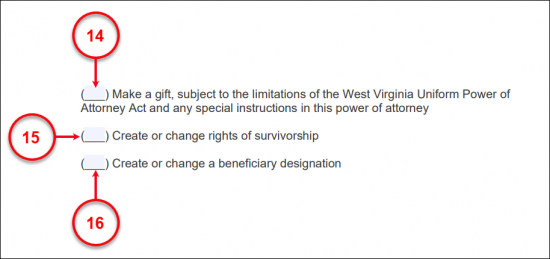
(17) Delegation. The Principal must specifically approve of the Agent’s ability to delegate the same powers named in this document to another Party. Thus, if the fourth action statement is not initialed, then the Agent will not be able to carry such an action out on behalf of the Principal and the powers granted through this document will remain set to the Principal’s documented preferences, approvals, and delegations.

(18) Beneficiary Rights. In addition to handling Beneficiary designations the Principal can make, the Agent can be given the power to refuse beneficiary rights of the Principal on behalf of the Principal.
(19) Exercising Fiduciary Powers. If the Principal is responsible for fiduciary matters, he or she can approve of the Agent’s actions to handle such matters on his or her behalf by initialing the seventh action statement.
(20) Refusing Property. If the Agent should be able to refuse interest in Property on behalf of the Principal, then the final action statement on this list by being initialed by the Principal.
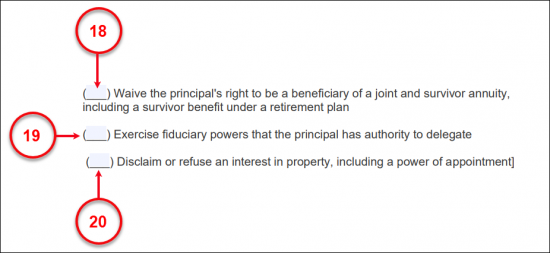
Agent’s Authority
(21) Special Instructions. This document presents the wording required to approve or authorize the West Virginia Attorney-in-Fact’s use of principal authority. The Principal can apply additional directives, restrict his or her Agent’s use of the granted authority, or even allow for conditions by using the first optional area provided to do so.

Nomination
(22) Nominee For Conservator Of Estate. The Principal has the option of nominating a Conservator (or Guardian) to his or her estate. This can be useful in a case where West Virginia Courts determine that he or she requires a court-appointed Guardian of Estate (or Conservator). Nominating a specific Party holds no guarantees to this appointment since this is strictly up to the jurisdiction taking action.
(23) Conservator Nominee Address and Phone Number.

(24) Nominee For Guardian. West Virginia Courts would take a nomination of a Guardian (or person) made by the Principal in this document seriously. Therefore, an area for this task has been provided. It should be noted that as with the Conservator, nominating a specific Guardian of Person does not obligate a West Virginia Court making such an appointment.
(25) Guardian Address And Telephone Number.

West Virginia Principal Signature And Acknowledgment
(26) Principal Signing. The signature of the Principal must be produced with the signature date alongside it for this document to be executed.
(27) Printed Name, Address, And Phone.
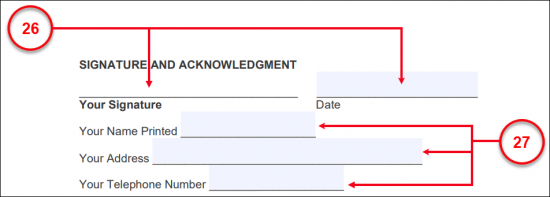
(28) Signature Notarization. The area where the West Virginia Notary Public can notarize (mandatory) this signing can only be tended to by the Notary Public fulfilling this function.
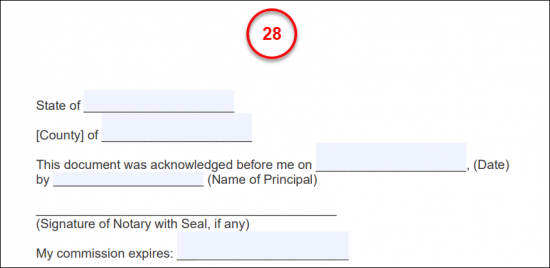
(29) Preparer Name. The individual that is responsible for the information supplied to the paragraphs requiring completion should present his or her name where it is requested.

Agent’s Duties
(30) Signing As Principal. An opportunity for the Agent to display the Principal’s printed name with the Agent’s signature is available to the Agent with the paperwork that he or she must review. It is recommended that the Agent take advantage of this practice area.

Agent’s Certification
(31) Location Of Agent Statement. The Agent’s acknowledgment of his or her appointment to the Attorney-in-Fact role in West Virginia needs to be attended to by the Agent, beginning with a formal recording of the county and state where the Agent review and certification is taking place.

(32) Agent Declaration. The Principal’s name, Agent’s name, and the power of attorney document date must be used to complete the language of the first paragraph. Provide these items exactly as they appear in the power of attorney template just completed.

(33) Relevant Agent Comments. The Agent is given the opportunity to place any comments, concerns, considerations, or provisions in writing before certifying his or her acceptance of the West Virginia Attorney-in-Fact role.

(34) Agent’s Dated Signature. The Agent must sign and date his or her acknowledgment certification before a Notary Public.
(35) Agent’s Printed Name And Contact.
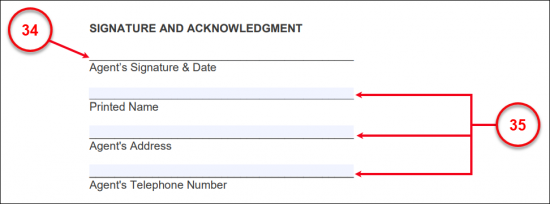
(36) Notarizing The Agent’s Certification. The Notary Public overseeing the West Virginia Agent’s signature acceptance will utilize the final area of this template to authenticate the Agent signing.

(37) Preparer Name. The Party who has physically reported information to the content of the Agent’s Certification should be identified.

Related Forms
Download: PDF

